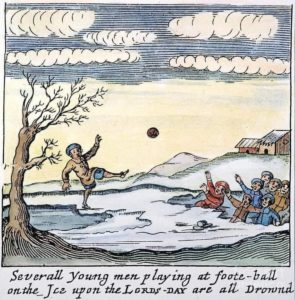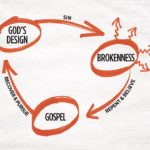(Untitled)

By a coincidental providence, tomorrow, on the high holy day of American sports, I am preaching on God’s blessing of the Sabbath day.
Thoughts on Descending Overture 21-D
One of the byproducts of Presbyterianism is that if you find yourself in a minority position on a constitutional amendment you have the distinct unpleasantness of being on the losing side of a vote three times in a single year. But three votes is three votes, not two votes, so though I have already been on the minority side on two votes on Descending Overture 21-D, it is not bad churchmanship to again make the case to decline its ratification. Presbyterian decision making is about process and persuasion, after all…

A Review of “Three Circles”
Turning Everyday Conversations into Gospel Conversations (Three Circles) by Jimmy Scroggins and Steve Wright has become a favorite evangelistic tool in Baptist circles. The North American Mission Board (the domestic mission arm of the Southern Baptist Convention) has adopted it and even created a companion website and app.
Scroggins and Wright are motivated to share the gospel with as many people as possible, and to equip the people of the church to this. A laudable motivation, to be sure. Thy are driven by a desire to see a multiplying church, especially in their unchurched South Florida context.
Now, a word needs to be said about whether South Florida (the authors are in West Palm Beach) is unchurched. They assert that 96% of the 1.4 million people in Florida are unreached and that West Palm Beach is an unreached city (pg. 17), something that is repeated regularly throughout the book. This, to put it bluntly, is inaccurate. The 96% unreached number comes from NAMB, which provides no data to back up their claim. Yes, the cited 2015 Barna data says that West Palm Beach is the city with the highest percentage of “never-churched” people in the United States (17%), but that means 83% of West Palm Beach has been churched at one time. That very same Barna report states that West Palm Beach is currently 52% churched, 48% unchurched, the 11th least-churched city in the country, but hardly unchurched or unreached. The Association of Religious Data states that in 2010 (most recent year for their data) Palm Beach County had a rate of 36.6% regular attending Christian adherents, with 10.9% of the population regularly attending an Evangelical Protestant church. No matter how you massage the numbers, South Florida is not unreached. That does not mean that sharing the gospel should be a lower priority, but that does mean Scroggins and Wright made me skeptical of their work. Misleading the reader on one point, intentionally or through unintentional sloppiness, means you’re untrustworthy on the others. When so much of the book’s argument is validated by the alleged effectiveness of the tool in converting the unreached, but it turns out the number of unreached is inaccurate, it calls into question the effectiveness of the tool and validity of the book’s argument…
The God Who Does Not Suffer
Based on two different email threads, from my sent folder.
God did not suffer on the cross. A theme in Athanasius’ Oration Against the Arians is that God does not suffer. Jesus in his person suffered, and according to his human nature suffered, but Jesus as the divine Word did not suffer. Khaled Anatolois in his work on Athanasius shows that the church father understood suffering in terms of passivity and activity rather than experience. Jesus in his humanity was subjected to suffering but in his divinity was the actor, not the one being acted upon (impassibility).
For example (Arians 3.56),
Wherefore of necessity when He was in a body suffering, and weeping, and toiling, these things which are proper to the flesh, are ascribed to Him together with the body. If then He wept and was troubled, it was not the Word, considered as the Word, who wept and was troubled, but it was proper to the flesh; and if too He besought that the cup might pass away, it was not the Godhead that was in terror, but this affection too was proper to the manhood. And that the words ‘Why have You forsaken Me?’ are His, according to the foregoing explanations (though He suffered nothing, for the Word was impassible), is notwithstanding declared by the Evangelists; since the Lord became man, and these things are done and said as from a man, that He might Himself lighten these very sufferings of the flesh, and free it from them. Whence neither can the Lord be forsaken by the Father, who is ever in the Father, both before He spoke, and when He uttered this cry.
Edward Shillito’s short poem “Jesus of the Scars” concludes with this stanza,
The other gods were strong; but Thou wast weak;
They rode, but Thou didst stumble to a throne;
But to our wounds only God’s wounds can speak,
And not a god has wounds, but Thou alone.
Jesus is God, so we can speak of God dying on the cross, having scars. This attribute to the person (Jesus is God) what is true according to one of his natures (humanity) since the divine cannot be wounded or killed.
This is what Cyril of Alexandria means when he says, “He suffered impassibly, because he did not humble himself in such a way as to be merely like us, rather, as I have said before, he reserved to his own nature its superiority over all these things.” Since Christ is a unified person we can speak of him suffering. He suffered in his humanity so according to his divinity he might elevate humanity from our suffering. John Behr’s The Nicene Faith deals with this topic in more depth in vol. 1, pages 226-232.
J. Todd Billings in his Rejoicing in Lament shows how this doctrine of impassibility (God doesn’t suffer) related to Jesus on the cross as a foundation for the Christian’s comfort amidst sorrow. Because God cannot suffer, suffering is not the final word. Suffering is not something that God must overcome for himself, but something he conquered on our behalf by virtue of his impassibility according to his divine nature in the person of Christ.
Announcing Traditional Model Seminary; Article up at Ref21
I have an article up at Ref21. It begins,
How I wish seminaries described themselves in press releases (let the reader understand):
Our approach to pastoral preparation is time-tested, rich, and rigorous.
The university has been the handmaiden of the church for over a thousand years. The model of pastoral preparation of devoting years of one’s life to study under specialized masters has produced generations of competent and faithful ministers who have lovingly shepherded Christ’s church. Here at Traditional Model Seminary (TMS), we are committed to continuing this great tradition of pastoral preparation with a successful track record literally millennia long…
This was a fun one to write.
